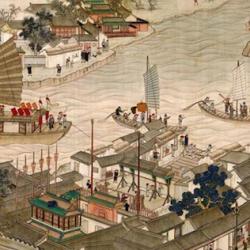David Goldman is a conservative and a patriot, and is not given to hyperbole. But he describes the current US attitude toward Chinas a “xenophobic” and “ugly,” and accuses fellow conservative Victor Davis Hanson of “crazy talk” about China.
In response to Trump’s tariffs on Chinese goods, “Chinese officials are warning that they are prepared not only for trade war, but for financial, diplomatic and limited military confrontation with the United States, in response to American demands for fundamental changes in Chinese economic policy.”
The U.S. has been taken by surprise as China has moved from “the smokestack-and-export model introduced in 1978 by Deng Xiaoping to a high-tech, consumer-focused model.” America “ignored China’s high-tech shift for years; now it has discovered that China threatens to leapfrog the United States in critical areas of high technology, military as well as civilian.”
American leaders thus misconstrue the balance of power: “The United States still believes it is powerful enough to bully China into submission, while the Chinese believe they are strong enough to come out on top in a confrontation with the United States.” Goldman thinks the Chinese are more realistic.
An economist in Chinas’s Trade Ministry, Mei Xinyu, explains the differences between Sin0-American relations in 2018 and in the 1990s, when there were trade conflicts between the two countries: “When we had our first trade conflicts with the US in the 1990s, the US economy was 15 times bigger than the Chinese. Today it is 1.5 times bigger. Not that we wanted a trade war back then – we could not afford it. Today we can afford it. The export share of our gross domestic product has dropped to below 20 percent since the peak of the early 1990s.”
As the Chinese see it, the U.S. isn’t looking for specific trade concessions, but trying to direct the course of Chinese economic development: “Beijing has concluded that Washington does not want specific trade concessions, the official continued, but rather wants China to abandon its economic policy of subsidizing nascent industries and acquiring advanced technology – in effect giving up its plans for economic development, in the Chinese perception.”
The xenophobia and crazy talk are evident at the “fringes” of the Trump administration. Hanson has asked, “why do we have a million Chinese nationals in the United States? Why are Chinese nationals buying property all over? If you’re a member of the Chinese Communist Party, maybe you can’t come to the United States. Maybe you can’t buy property.”
Goldman considers this “crazy talk,” not least because important sectors of the American economy depend on Chinese students: “About 350,000 Chinese students now study at American universities, and they dominate tech disciplines. Only 7% of American students major in engineering vs. a third in China.”
It’s self-defeating too because many of these Chinese students would be delighted to devoted their talents to helping the U.S., rather than supporting the oppressive regime in China. As Goldman wryly puts it, “If you want American patriots who will devote their talents to building American strategic superiority, you may have to look for them among foreigners who are weary of the oppressiveness of their own governments.”
Goldman suggests that the the U.S. attempt to wean Chinese students away from China, force a “brain drain,” similar to the Allied siphoning of German engineers during World War II. He cites Ian Jacob’s old quip that the Allies won the war because “our German scientists were better than their German scientists.”
Goldman states his own position: “As an American, I want China to be prosperous, secure, and well behind the United States.” Given the repressiveness of China, this is the right position.
But that needs to be qualified: It’s the right position for the time being. If the church continues its current trajectory in China, it can’t help but have a dramatic impact on political culture. In the long run, it would be no shame for the U.S. to take second position to a China infused with Christianity.
That’s a distant prospect, perhaps a very distant one. But it would be dangerous for the U.S. to insist on global hegemony no matter what. That would be another kind of crazy talk.












